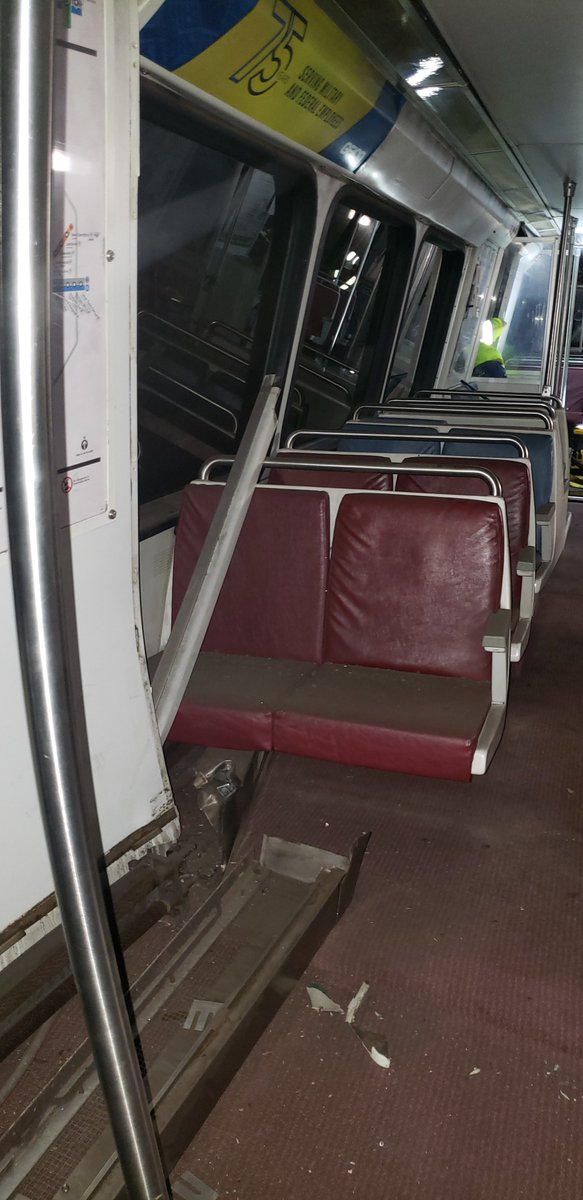We have lots on the agenda for today’s meeting including significant safety event investigation reports, annual reports, continuing ROCC concerns, and our latest audit work
Watch live starting at 12:30 wmsc.gov/meetings/
Watch live starting at 12:30 wmsc.gov/meetings/
Join us on YouTube for our remote public meeting on our #WMATA oversight work
If you would like to participate with a public comment, please join through the Zoom webinar link instead, which is posted at wmsc.gov/meetings/
WMSC Safety Officer Richard David has our safety message:
While safety is literally one of our middle names, safety is also highlighted for the general public in June as National Safety Month
While safety is literally one of our middle names, safety is also highlighted for the general public in June as National Safety Month
This year’s National Safety Month topics are Emotional Health, Ergonomics, Building a Safety Culture, and Driving safely. 



Talk to people, use support groups
Take breaks from screens, walk around
Build safety culture w/open communication, non-punitive reporting, training & leading by example
Never operate vehicle impaired, drowsy, or distracted by phones, eating, reading, putting on makeup, shaving…

Take breaks from screens, walk around
Build safety culture w/open communication, non-punitive reporting, training & leading by example
Never operate vehicle impaired, drowsy, or distracted by phones, eating, reading, putting on makeup, shaving…

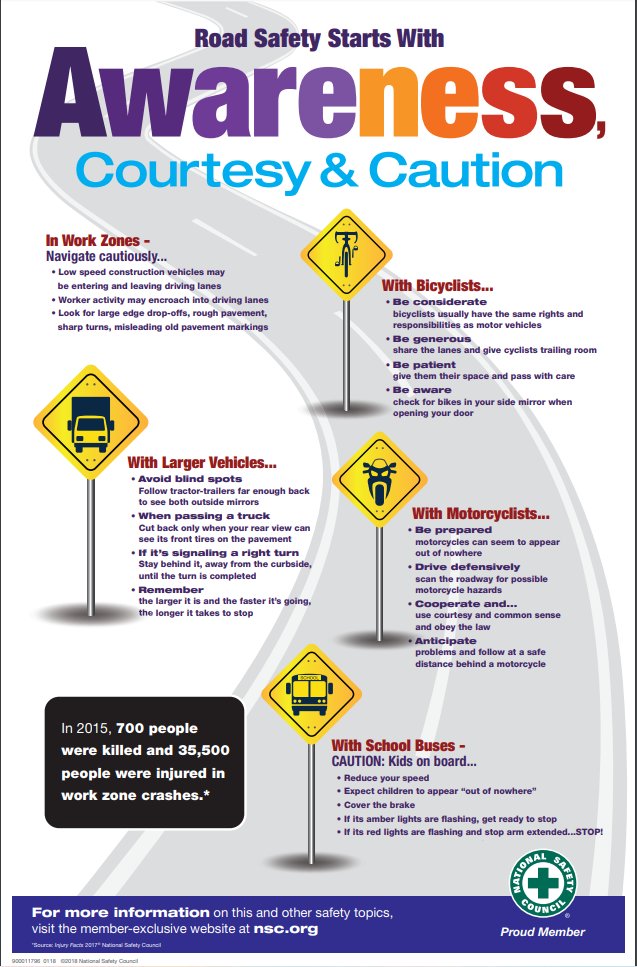
Now on to public comments (you can always reach out @MetrorailSafety here, on Facebook, Instagram, via email or through our web form wmsc.gov/report/): None today
WMSC Chair Christopher Hart opening remarks:
Our nation is struggling in the throes of two horrific occurrences - #COVID19, and police violence against people of color.
Our nation is struggling in the throes of two horrific occurrences - #COVID19, and police violence against people of color.
Chair Hart: The WMSC extends its sympathies and condolences to the families and friends of nearly 120,000 people who have died and to many more who have suffered – medically or financially 

Chair Hart: We support our nation working together, paying attention to the public health and financial experts, and learning from this event to emerge stronger than ever.
The WMSC acknowledges and supports Metro’s initiatives to create a safe traveling environment for the public and a safe work environment for Metro’s employees; and we will do all we can, within our sphere of influence, to help generate this positive outcome. 

Chair Hart: Regarding the police violence, we at the WMSC stand in solidarity with the majority in this country, and with much of the world, against systemic racism. Violence and hatred cannot be tolerated in our society.
Chair Hart: The terrible and unnecessary death of George Floyd, and many before him and still more since, is beyond description and belief. We must stand together to assure that such tragic events are never repeated. We will not be silent.
Chair Hart: Racial oppression of all types, including by police, makes it much more difficult for those who are oppressed to pursue legitimate opportunities that, if properly pursued, could benefit both themselves and our society as a whole.
Chair Hart: Racial oppression is not only immoral, it undermines society as a whole. That lose-lose outcome is unacceptable, and WMSC will do all we can, within our sphere of influence, to eliminate racial oppression and its adverse effects
Chair Hart, personal note: Every time I go out the door, I wonder, what if it happened to me? Cites Henry Louis Gates at his own home; What about public space?
"It's up close and personal to me"
"It's up close and personal to me"
Chair Hart on today’s agenda:
- Final report on Oct. 7 BL/OR/SV collision (& other investigations)
- Update on ROCC & track Corrective Action Plan proposal status
- New WMSC audit of #WMATA RWP
- First WMSC annual reports
- Resolutions
- Final report on Oct. 7 BL/OR/SV collision (& other investigations)
- Update on ROCC & track Corrective Action Plan proposal status
- New WMSC audit of #WMATA RWP
- First WMSC annual reports
- Resolutions
CEO David Mayer: Continuing steps to protect WMSC staff, including extra focus on remote meetings and data collection. Helped by WMSC Compact requirement #WMATA provide unfettered access to employees and info including electronic systems and databases
CEO Mayer: Rail Operations Control Center remains area of concern. Findings issued in December and last month require corrective actions. Promising letter from WMATA executives, but formal CAP proposals are lacking. ROCC audit work continues to identify additional concerns
CEO Mayer: Importance of ROCC backup facilities demonstrated by May 27 fire at #WMATA HQ. It’s a reason WMSC has oversight for all property owned, leased, operated or otherwise used by Metrorail
https://twitter.com/MetrorailSafety/status/1265618003485437953
CEO Mayer: The fire at Metro headquarters caused significant damage to floors above ground level due to soot and water damage. Thanks to WMATA for transparency that day, including briefing on scene for WMSC staff
Mayer: Source of JGB fire under investigation, investigators concluded it was accidental, electrical. Appears to have started in area of eight floor office. Metrorail says fire did not damage main servers, communication or compromise related data
Mayer: Many #WMATA employees had already been working remotely due to #COVID19 at least part time, but now building is closed to all but ROCC and critical cleanup workers. This has limited remote access to info and some data recordings since desktop computers are off
On service, #WMATA remains on significantly reduced levels.
WMATA is beginning to check closed stations to see if they are inspected, operational and ready to reopen. The WMSC will be monitoring this



WMATA is beginning to check closed stations to see if they are inspected, operational and ready to reopen. The WMSC will be monitoring this


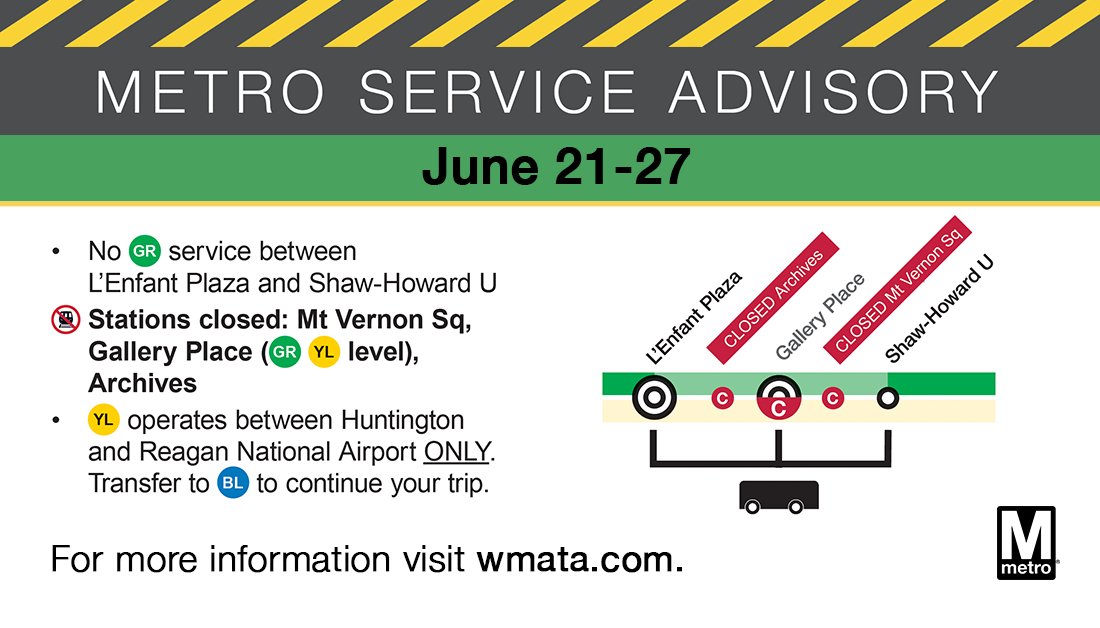

Older #WMATA railcars remain in yards with only 7000 Series trains running. The first 2000 and 3000 Series cars have been powered back up into idle mode at West Falls Church. We are looking into Metrorail’s plans to bring those older railcars back into service.
Mayer: WMATA’s ongoing OR/SV shutdown west of Ballston and current rotating GR/YL shutdowns fall under our safety oversight responsibility. Particularly for OR/SV work, ensuring all required safety certification steps followed
Mayer: After issues we identified last year, WMATA took a significant step this year to implement a Spanish-language Roadway Worker Protection training class
Mayer: On Silver Line tie-in:
- work set to start at Wiehle-Reston East, expected to be completed this summer. Monitoring
- We are proactively conveying expectations and requirements to WMATA and MWAA to ensure proper safety certification and verification activities are conducted
- work set to start at Wiehle-Reston East, expected to be completed this summer. Monitoring
- We are proactively conveying expectations and requirements to WMATA and MWAA to ensure proper safety certification and verification activities are conducted
Mayer: WMSC finalizing Silver Line Phase 2 Fire-Life Safety Assessment that identifies a few areas where changes are required, and several recommended changes that could also reduce risks
Mayer: We are working with WMATA on draft agency safety plan revisions, expected to be presented for review and vote this fall
Welcome to WMSC:
- Brackett Smith, Attorney Advisor and Government Relations Lead, was DC Council Assistant General Counsel
- Davis Rajtik, Audit Manager, also lawyer & on Arlington Transportation Commission
Mayer also thanks departing Chris DiFatta for exceptional service.
- Brackett Smith, Attorney Advisor and Government Relations Lead, was DC Council Assistant General Counsel
- Davis Rajtik, Audit Manager, also lawyer & on Arlington Transportation Commission
Mayer also thanks departing Chris DiFatta for exceptional service.
Now on to final safety event investigation reports
COO Sharmila Samarasinghe: We are presenting a final investigation report into one of the most serious incidents to occur on #WMATA's system in the last few years. One train ran into the back of another near Farragut West Oct. 7, causing substantial damage and service disruptions
Samarasinghe: Had riders been on either of these trains, it is likely that there would have been serious injuries.
Our team responded to the scene, and followed up with participation in interviews, data analysis and steps like engineering summit.
Our team responded to the scene, and followed up with participation in interviews, data analysis and steps like engineering summit.
Samarasinghe: Soon after collision, WMSC issued findings requiring corrective actions including:
-Do more to prevent unauthorized movement of trains without speed commands
-Do more to prevent use of electronic devices, and ensure they're collected and analyzed in investigations
-Do more to prevent unauthorized movement of trains without speed commands
-Do more to prevent use of electronic devices, and ensure they're collected and analyzed in investigations
Samarasinghe: As the investigation has continued over the following months, we have learned more about the accident.
WMSC Operations Expert Bruce Walker: Collision at 12:48 a.m. Oct. 7, 2019 after Nationals playoff game.
Both trains 3000 Series, out of service.
Each six-car train sustained substantial damage.
Delays for riders for >24 hours
Both trains 3000 Series, out of service.
Each six-car train sustained substantial damage.
Delays for riders for >24 hours
B. Walker: Train 700 was moving 11 mph (and accelerating) from Foggy Bottom toward Farragut West at time of the collision.
Train had lost speed commands, indicating operator was required to stop and not proceed without explicit permission over radio
Train had lost speed commands, indicating operator was required to stop and not proceed without explicit permission over radio
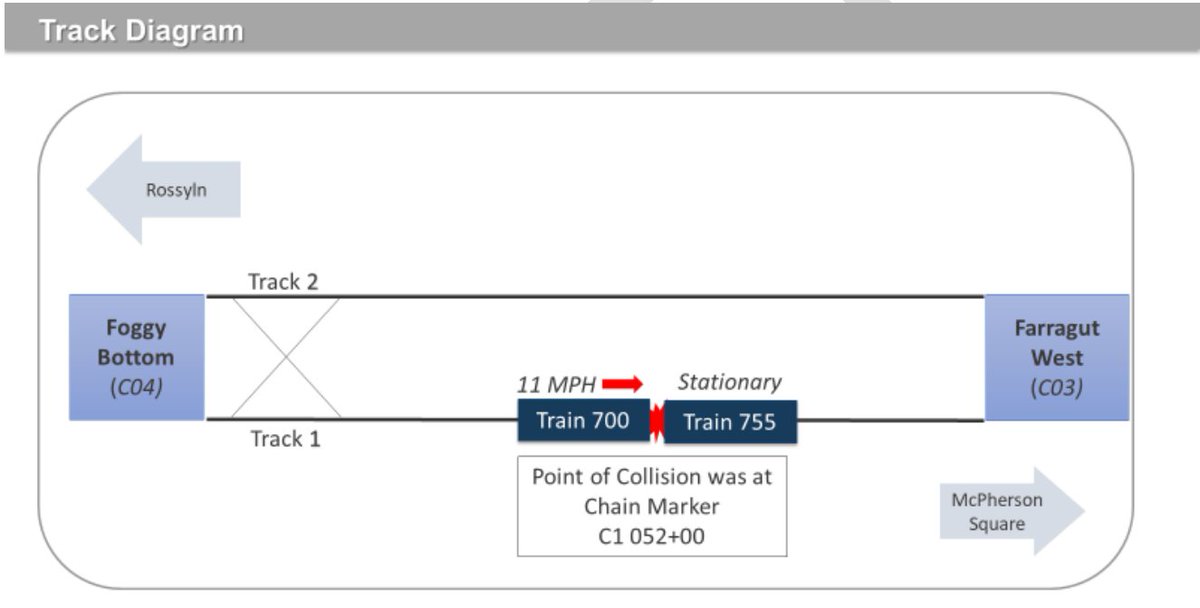
In less than three minutes, Train 700 operator accelerated 3 times above 15 mph, triggering auto brakes. Then moved ahead again at up to 4 mph, then was accelerating a fifth time at time of collision
Train 700 operator accelerated around a curve and train speed increased from 9mph to 11mph in final 69 feet before impact.
Train 755 had been stationary in tunnel waiting for another train to clear the area ahead.
Train 755 had been stationary in tunnel waiting for another train to clear the area ahead.

The Rail Operations Control Center did not immediately identify that there had been a collision, and the train operator of the moving train did not immediately report the collision
About 3 minutes after the collision, Train 755 operator reported the train had been struck from behind by something.
ROCC then contacted Train 700 operator, who then acknowledged collision
ROCC then contacted Train 700 operator, who then acknowledged collision
A desk within the ROCC notified D.C. 911 dispatchers about 6 minutes after the collision that an EMS response was needed for train operator injuries
About two minutes after that, ROCC de-energized third rail power
About two minutes after that, ROCC de-energized third rail power
10 minutes after collision, each train operator told ROCC they were injured and would not be able to leave train to do a damage inspection.
Arriving supervisors found Train 755 operator lying on floor with back pain
DC Fire arrived approximately 22 minutes after the collision.
Arriving supervisors found Train 755 operator lying on floor with back pain
DC Fire arrived approximately 22 minutes after the collision.
Rail supervisor who did walk around found notable damage that blocked access to some cars. Emergency exit door seen here at rear of car could not be opened due to ceiling damage. 


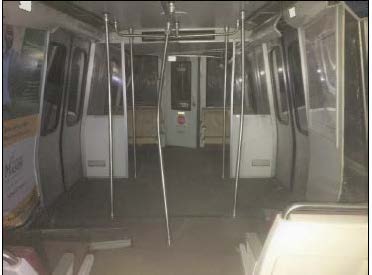
The trains were about 6 feet apart after collision.
All the cars on each train were squeezed together, except for the cars that separated from Train 755. The two sections of Train 755 ended up about 18 inches apart
Anti-climbers engaged – designed to limit telescoping of cars.



All the cars on each train were squeezed together, except for the cars that separated from Train 755. The two sections of Train 755 ended up about 18 inches apart
Anti-climbers engaged – designed to limit telescoping of cars.

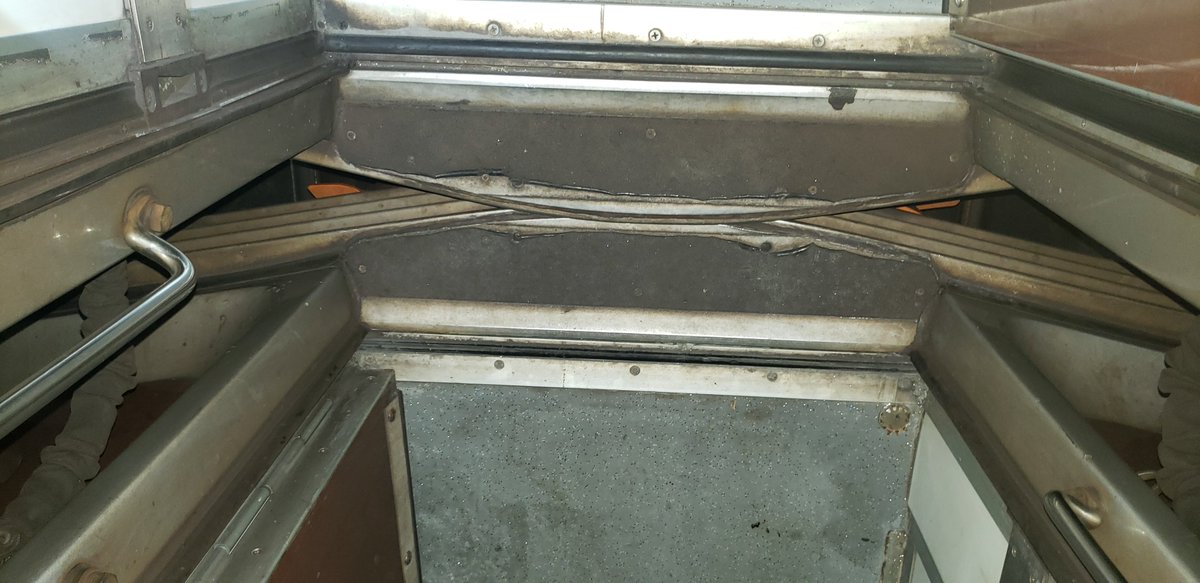


#WMATA plans to repair six of the 12 cars involved in the crash at an estimated cost of $135,188
The other six cars are effectively totaled
(3008, 3009, 3206, 3207, 3120 and 3121)
The other six cars are effectively totaled
(3008, 3009, 3206, 3207, 3120 and 3121)

Given the average price for a new 7000 Series car was around $2 million, the total damage from this collision, based on replacement cost, is estimated to be more than $12 million (note: cars involved here are older)
Damage included buckled floors and ceilings, at least one car that hit the top of the tunnel, and damage to ventilation, propulsion and coupler systems.
To remove the cars from the area, windows were removed so that straps could be used to secure undercar equipment. The cars were moved to a rail yard for additional investigative work. 

In operator interviews, Train 755 operator recalled train going dark as it was jolted forward; a piece of metal flew in cab. Collision knocked out carborne radio; eventually used handheld to contact ROCC. Said delay was processing what happened
Train 700 (striking train) operator had been disqualified for 18 months in 2006 after collision, red signal overrun, station overruns. Reinstated 2010. Red signal violation 2011, derailment 2013, fail to report station overrun 2015, operated w/cab door open/talking to rider 2015
Supervisors had recorded 9 ride checks on Train 700 operator July-Oct. 2019 with no reported issues
Investigation concluded Train 700 operator did not follow procedures requiring safety stops, did not follow rules governing train movement without speed commands, failed to report the accident, and provided false statements during the investigation.
Train 700 operator refused to provide cell phone as part of investigation, but records for that phone and associated numbers indicate it was in use at and around time of collision. Investigation could not prove the operator was in possession of the phone
Fatigue review found Train 700 operator at elevated risk due to night work and unexpected call-in. Got less than 6 hours of sleep interrupted by phone call asking to come in early.
#WMATA actions since collision:
Train 700 operator no longer works for WMATA and is not eligible to be rehired
Memo on loss of speed command rules
Expansion of mode awareness tool to all car types
Address emergency response efforts
Train 700 operator no longer works for WMATA and is not eligible to be rehired
Memo on loss of speed command rules
Expansion of mode awareness tool to all car types
Address emergency response efforts
CEO Mayer: This is an extremely serious event that highlights several significant issues facing the Metrorail system
CEO Mayer: The accident was avoidable if proper procedures and protections were in place.
CEO Mayer: This event demonstrates the risks that arise from a long-term failure to address the unauthorized movement of trains with zero speed commands.
We issued that finding back in November, and Metrorail must move expeditiously to implement fixes.
We issued that finding back in November, and Metrorail must move expeditiously to implement fixes.
CEO Mayer: There are areas of the system where speed commands have regularly dropped out for years with no fixes. That has contributed to a culture where proper procedures for movement with zero speed commands have been frequently ignored. We need this to change.
CEO Mayer: To be clear, this was not “just” a low speed collision involving trains that were out of service. This is the most significant collision on Metrorail’s mainline tracks in years.
CEO Mayer: If there had been passengers on either of these trains, there would likely have been serious injuries.
CEO Mayer: Our full team responded to this accident because of the severity of this event, and we will ensure that Metrorail takes the proper steps needed to significantly reduce the likelihood of any similar event occurring in the future.
Explaining "zero speed commands", expert Bruce Walker says that the "Zero" number means operator needs explicit radio permission to proceed
Explaining mode awareness tool, CEO Mayer says rail system designed for automatic, but with manual mode use of stop & proceed on mainline tracks has become more common given areas with zero speed commands. Tool makes more clear operator moving under this rule thru acknowledgement
The full report just adopted by our Commissioners on the Oct. 7, 2019 #WMATA collision near Farragut West is now available here: wmsc.gov/wp-content/upl…
With the investigation complete, we are also providing the photos taken by WMSC staff during response: wmsc.gov/wp-content/upl…
With the investigation complete, we are also providing the photos taken by WMSC staff during response: wmsc.gov/wp-content/upl…
Next investigation report, presented by our Track and Structures expert Jemayne Walker, covers a serious injury to a #WMATA employee between DCA and Potomac Yard on 3/4/20
J. Walker: IT Dept employee escorting contractors was setting up on-track protection around 2:35 a.m., tripped on debris near safety walk; kept working, but later went to hospital and was diagnosed with broken ankle
This was not reported to MOC; IT supervisor did not notify IT Dept management until 4:32 a.m. This was not reported to other departments as required until 3:15 p.m. after the employee reported hospital diagnosis
The investigation finds the IT supervisor was not familiar with injury reporting or post-accident testing requirements.
There is a significant step required to reach the safety walk, and there was debris in the area (photo taken in daylight after proper report, but incident occurred at night) 

The investigation concludes that IT department supervisors are not familiar with the required reporting procedures for accidents.
After this injury, Safety Dept provided those procedures at Local Safety Committee.
After this injury, Safety Dept provided those procedures at Local Safety Committee.
Investigation concludes height of the step from Safety Walk to ground was not highlighted in job safety briefing.
Situational awareness is crucial to safety on the Right of Way.
Metrorail’s IT Department to review and assess work instructions to identify and mitigate hazards
Situational awareness is crucial to safety on the Right of Way.
Metrorail’s IT Department to review and assess work instructions to identify and mitigate hazards
Next investigation report: Hi-Rail Vehicle derailment at edge of Brentwood Rail Yard 2/14/20 12:48 a.m. (No injuries)
Vehicle was in reverse gear, using rearview camera to observe direction of travel; Utility Interlocking Operator in Training had given permission to proceed.
That trainee then moved switch while vehicle was still 20 feet short of traversing it
That trainee then moved switch while vehicle was still 20 feet short of traversing it
Trailing axle derailed. Investigation finds trainee interlocking operator assumed vehicle had cleared switch after signals dropped out and set new route for waiting maintenance vehicle 



Investigation concludes
-interlocking operator trainee set route without radio confirmation high rail unit was clear
-Interlocking Operator training UIOT failed to provide adequate oversight
-Vehicle operator failed to identify switch alignment
-WMATA to retrain those involved
-interlocking operator trainee set route without radio confirmation high rail unit was clear
-Interlocking Operator training UIOT failed to provide adequate oversight
-Vehicle operator failed to identify switch alignment
-WMATA to retrain those involved
For our final investigation report on agenda today, we return to Operations Expert Bruce Walker: This covers a train striking a customer at Court House 1/23/20. CCTV suggests some type of medical emergency
Another customer tried to stop the person’s fall by grabbing at the person’s scarf, but the person still fell in front of an oncoming train. Train operator hit emergency brake; Arlington FD responded, customer alert when taken to hospital
Moving on to corrective action plans update
COO Samarasinghe:
First, after several months of back and forth with WMATA to ensure the plans will have the intended, lasting impacts, we have approved the CAPs that will address the findings from the Track Audit we issued in February
COO Samarasinghe:
First, after several months of back and forth with WMATA to ensure the plans will have the intended, lasting impacts, we have approved the CAPs that will address the findings from the Track Audit we issued in February
The plans will (1/2):
•Ensure a complete written set of protocols governing track maintenance practices
•Set requirements for verifying speed restrictions
•Provide required quality control documents
•Standardize Yard Inspection Forms
•Ensure a complete written set of protocols governing track maintenance practices
•Set requirements for verifying speed restrictions
•Provide required quality control documents
•Standardize Yard Inspection Forms
The plans will (2/2):
•Ensure appropriate training is provided
•Ensure heat rides are properly conducted
•Ensure rail lubricators are properly refilled
•Implement annual culvert inspections
•Ensure quality control checks are completed as required.
•Ensure appropriate training is provided
•Ensure heat rides are properly conducted
•Ensure rail lubricators are properly refilled
•Implement annual culvert inspections
•Ensure quality control checks are completed as required.
COO Samarasinghe: We will move to close the CAPs only when we are satisfied the plans are fully implemented over the coming year
COO Samarasinghe: Second, we continue a significant focus on the safety problems in the Rail Operations Control Center (ROCC)
In December, we directed #WMATA to address the dangerous dysfunction in the ROCC identified in a Dec. 10 smoke event.
In May, we issued 3 more findings based on additional audit work: power restoration, remote manipulation, lack of fan training
In May, we issued 3 more findings based on additional audit work: power restoration, remote manipulation, lack of fan training
Samarasinghe: Late last month, Metrorail outlined some initial steps they are taking on their own to address the issues we raised May 12, but we remain concerned that their proposed corrective action plans fall short of what is required to create substantive and lasting change
Samarasinghe: Some Metrorail managers have suggested limiting management attendance at training that could address some of the dysfunction in the ROCC, for example, and are not yet invested in safety-critical changes needed to the power restoration process.
Samarasinghe: There does appear to be better understanding of the need for consistent, complete and ongoing fan operations training, but changes must be long-term, not just a one-time crash-course on fans the controllers were not properly trained on how to use in the first place
Samarasinghe: Our months of investigative work on issues in the ROCC is not yet over, and we expect to identify additional significant issues that must be addressed
COO Samarasinghe explains WMSC efforts to get Metrorail changes implemented by CAPs to stick
Post-implementation, monitor in inspections, reviews of recordings, and reviews of documentation/reports
Post-implementation, monitor in inspections, reviews of recordings, and reviews of documentation/reports
We also have a new audit report ready today
This audit of Roadway Worker Protection (RWP) examines this primary method of protecting all those who must be on or near the tracks
This audit of Roadway Worker Protection (RWP) examines this primary method of protecting all those who must be on or near the tracks
CEO Mayer: There has been progress on this since the Federal Transit Administration raised concerns in 2015, but additional steps are required to address ongoing safety gaps in the Roadway Worker Protection Program.
This is an especially important issue at Metrorail because eight employees were struck and killed by oncoming trains between 2005 and 2010. In investigations of two of those cases, the National Transportation Safety Board found that the worker protection rules were lacking.
RWP Audit:
👍🏽Increased RWP training & certification compliance
👍🏽 Written RWP requirements and policies are generally sound.
👎🏽👎🏽 There are at least pockets within WMATA where RWP rules are regularly not being followed. That could lead to injuries, accidents or fatalities.
👍🏽Increased RWP training & certification compliance
👍🏽 Written RWP requirements and policies are generally sound.
👎🏽👎🏽 There are at least pockets within WMATA where RWP rules are regularly not being followed. That could lead to injuries, accidents or fatalities.
In a number of these cases – there has been “practical drift” with the actual actions in the field no longer matching established procedures. 

To ensure the safety of those on the tracks, we are issuing 11 findings requiring Corrective Action Plans that will address shortfalls in policy, procedure or implementation of the RWP Program.
Some critical safety rules are being ignored, such as the placement of a watchman/lookout at least 50 feet ahead of a work crew. This is required so that the watchman/lookout can provide ample time for crews to get out of the way when a train is approaching.
Electrical safety warning equipment is being used without current calibration, which could put workers at risk.
Some workers are not meeting all personal protective equipment requirements because they are not wearing proper reflective vests or are covering those vests with backpacks. A backpack also poses an additional risk of entrapment.
Metrorail’s higher-level RWP training classes are lacking in consistency and practical exercises. The instructors for those classes are also not being given the opportunity to meet their own requirements for continuing education and experience.
Metrorail has failed to follow its own policies requiring reviews of RWP rules on a regular basis and requiring the inclusion of the Safety Department and Metro Transit Police in the review of those rules. Departments were not aware of their responsibilities on those fronts
Clear communication is essential to safety. Metrorail must create a clear definition of a train in approach to area where foul time has been granted. This will ensure operators are properly warned of those on the tracks, to achieve the intended redundant layer of protection.
Metrorail will have 45 days to propose specific Corrective Action Plans to address these issues.
With our Commissioners’ assent, this Audit of #WMATA Roadway Worker Protection (RWP) sent to WMATA today is now final – read it here: wmsc.gov/wp-content/upl…
Next up: Our first annual reports. We are required to do two: one on our own operations, and another on WMATA Rail System safety. These are for calendar year 2019.
CEO Mayer: I am proud to present our first annual reports. These reports are required by the WMSC Compact, but they have really crystallized for me just how far we have really come as an organization.
CEO Mayer: The WMSC had an extremely productive year that included taking over direct safety oversight for Metrorail, building a solid team, expanding our expertise, and issuing our first findings and directives.
CEO Mayer: I would like to thank Virginia, Maryland, D.C., and federal leadership for helping to make this all possible. And thanks to @MWCOG for additional assistance
Chair Hart: Since our creation, the WMSC has worked tirelessly to build expertise and create a new safety oversight and enforcement framework on one of the busiest and most important rail transit systems in the country.
Chair Hart: As we build on @FTA_DOT work, entire region should be extremely proud that Maryland, Virginia and the District were able to come together to ensure robust, independent safety oversight of Metrorail.
Chair Hart: The focus is always continuously improving safety.
This safety report identifies many of the areas where that effort has made substantial impacts so far, and other areas where we are requiring Metrorail to make those changes for the future.
This safety report identifies many of the areas where that effort has made substantial impacts so far, and other areas where we are requiring Metrorail to make those changes for the future.
Chair Hart: The ROCC is among the areas of significant concern. It is an area where concerns have been raised before, including when I was Chairman of the National Transportation Safety Board as we investigated the fatal 2015 electrical arcing and smoke event near L’Enfant Plaza.
Chair Hart: There are areas of progress, including on Metrorail’s plans for an improved fatigue management policy. This detailed plan will address a significant concern of mine. It will be most effective as a true partnership between Metrorail leadership and frontline workers.
In total, Metrorail reported 716 total safety events in 2019.
Chair Hart: The Washington Metrorail Safety Commission will continue thorough investigations of safety events in order to identify ways to continually reduce the risks to customers, workers and others in the Metrorail system.
Chair Hart: Safety is not something that is achieved at some point, and the work stops. This is a never-ending journey.
CEO Mayer: We are committed to the safety of every single Metrorail rider, employee and contractor, as well as anyone else who comes into contact with the system
CEO Mayer: #WMATA has made some progress on Safety Management System approach through QICO and OIG, but there is more to do to build a strong safety culture
CEO Mayer: There will never be a day with zero CAPs, and there should not be. That would be an unacceptable sign of complacency.
Still, the goal is to eliminate or mitigate as many risks as possible proactively before a safety event, rather than reactively afterward
Still, the goal is to eliminate or mitigate as many risks as possible proactively before a safety event, rather than reactively afterward
CEO Mayer: Metrorail is making some significant progress in certain areas, but there is much more work to be done.
WMSC Commissioners have adopted our first annual reports
The Annual Report on the Safety of the WMATA Rail System in 2019 wmsc.gov/wp-content/upl…
And the Washington Metrorail Safety Commission 2019 Annual Operations Report wmsc.gov/wp-content/upl…
The Annual Report on the Safety of the WMATA Rail System in 2019 wmsc.gov/wp-content/upl…
And the Washington Metrorail Safety Commission 2019 Annual Operations Report wmsc.gov/wp-content/upl…
On to resolutions: First up is a revision to part of our program standard – a table that lists the minimum type of report and formal notification required from WMATA for various types of safety events (WMSC can and does require additional info in many cases)
Business Process Specialist Lahiru Kaunaratne: Changes meant to improve our data collection and analysis and capture all intended safety events. Revisions based on 15 months of experience.
Final resolution is tied to contracts for legal and IT services, and contract extension for HR and accounting services
Chair Hart: I would again like to remind everyone that you can always report any concerns or otherwise get in touch with @MetrorailSafety through our website, wmsc.gov; through social media channels; or by email wmsc.gov/report/
And that’s it for this month’s public meeting.
Next Commissioners meeting is expected to be Aug. 4.
Thank you for joining us.
Next Commissioners meeting is expected to be Aug. 4.
Thank you for joining us.
• • •
Missing some Tweet in this thread? You can try to
force a refresh

